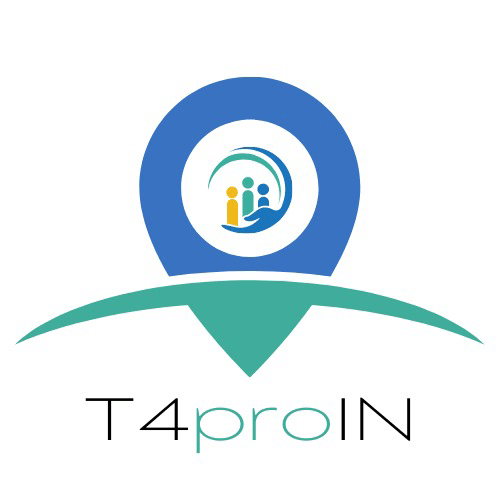Activity 1
Development of criteria and standards to be included in a new training programme for staff working with people with disabilities in tourism

Thanks to the T4proIN project, all workers in the tourism sector will be able to learn how to offer more
inclusive services for different types of disabilities (more common ones), and to know the basic necessary
communication measures and needs.
Visit the
elearning platform
All interested users will be able to easily discover the nearest accessible places using a user-friendly
digital map. This tool provides detailed information about facilities committed to accommodating individuals
with disabilities, enhancing user access to various services and locations.
Navigate to
e-map

The T4proIN project was born with the aim of increasing the accessibility of the tourism sector in all its
branches.
People with disabilities often cannot travel on their own because the communication barriers they encounter
are too pervasive: information is not in easy-to-read language, announcements are only broadcast with audio,
"wheelchair-friendly" hotel rooms have mirrors and sinks that are impossible to reach. These are just a few
examples of impediments that people with disabilities face when traveling.
Development of criteria and standards to be included in a new training programme for staff working with people with disabilities in tourism
Development of the T4proIN training programme
Testing of the methodology for staff in leisure facilities, hotels, airports, train stations and for tourist guides
Development of the free MOOC training, development, and testing of an e-map in the languages of the countries involved
The city of Cádiz hosted a series of work sessions framed in the European Project 'T4proIN' on
professional training in Inclusive Tourism. The Councilor for Tourism, Montemayor Mures, has
highlighted the "importance and interest" of said meeting to continue advancing in this axis of the
Strategic Plan for Tourism, since the attending experts have made a diagnosis that will allow "solving
problems and adopting measures that increase the social inclusion of people with disabilities, promoting
equal opportunities in the city's tourism sector.
Read
the article
CEIPES hosted project partners to discuss project status and plan the next steps. Activities carried
out:
- Desk research and data analysis about tourism, disability, and accessible tourism.
- Development and dissemination of two questionnaires for needs analysis.
- Conducting collective webinars in the consortium.
- Meetings with local associations in the field of inclusive tourism.
- A survey in leisure structures for investigating their expectations.
Read
the article
Partners met in Larissa, Greece, hosted by Digital Idea, for the third transnational meeting. The consortium
reviewed significant progress in two key areas of the T4proIN project: finalizing training content,
including videos, and developing the interactive E-learning platform and e-map. The MOOC platform is central
to the project, providing quality training to improve accessibility in tourism.
Discussions focused on the platform's structure, content, and interactive features to ensure a valuable
learning experience. The e-map, another critical component, will offer comprehensive information on
accessibility features across hotels, restaurants, and attractions, empowering travelers with disabilities
to plan effectively.
The meeting concluded with renewed commitment and enthusiasm, allowing partners to refine their strategies
and establish a clear path toward achieving the project's objectives.
Read
the article
The project's core vision is to establish common standards and competencies for employers and employees in
the travel industry, providing them with the tools to welcome people with disabilities. To this end, a
comprehensive training program was developed to equip trainers and staff with skills to meet the diverse
needs of individuals with disabilities.
Through a combination of webinars and in-person meetings with inclusive tourism organizations and
individuals with disabilities, project partners explored current training programs, needs, and experiences.
This work, alongside analyzing the legislative framework in each participating country, highlighted the
crucial role of policy support for inclusive tourism.
What sets T4proIN apart is its holistic approach to accessibility. By embracing accessibility as a universal
value rather than solely focusing on disability, the project acknowledges that each individual may have
specific needs at some point in their life. This paradigm shift fosters an inclusive environment that
benefits everyone.
Read
the article